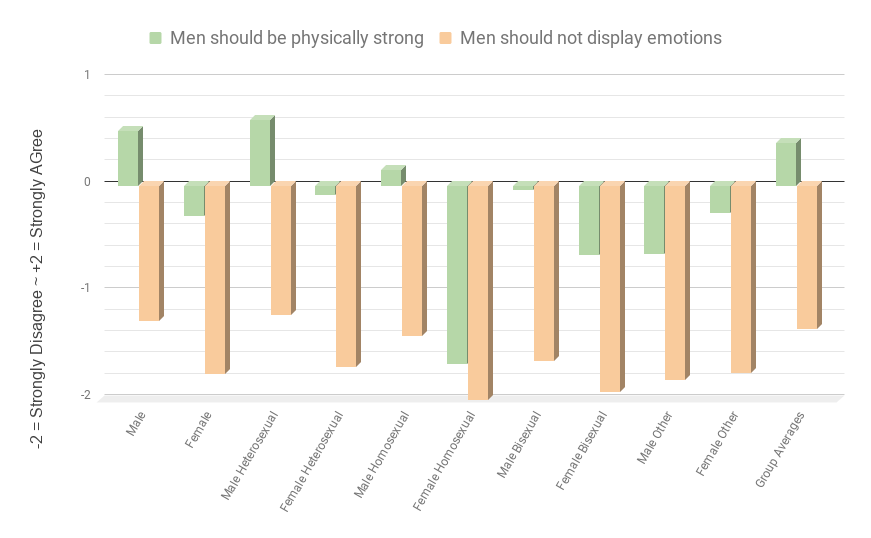For quite some time now I have been asking the people of Reddit, Facebook, and the humans around me what they think when it comes to the topic of masculinity.
I have been listening and observing what people think on this topic publicly since 2014. You can check out some of the interviews I have done here if you like photos and here if you like videos.
I recently started an ongoing survey focused on questions based on the topic of masculinity(big surprise I know). If you want to contribute to this ongoing data collection I would highly appreciate it. Click this button to go to it.
Anyway, truth be told I was not expecting this amount of response to the survey. I was happy to see the amount of activity and that I will be able to produce some cool graphs and observe the type of data from it.
Below I have started to compile the data for everyone to check out. When I started making the graphs I had 460 submissions. I will try and continue to update this as it grows. I will be commenting below each graph with my thoughts and observations.
Lastly, before we jump in this survey is in no way scientifically sound, it is merely for observations and conversations. Please do no use this data to support an argument.
Data On Sex & Sexual Orientation
The following graphs/charts were created with the focus on sex and sexual orientation.
Graph #1
So as you can currently see predominantly Heterosexual Males filled this form out. So keep that in mind as you observe the rest of the data. I hope to collect more data from other sexual orientations to help better represent their views and beliefs.
Graph #2
As I started to make comparisons of data I found it fascinating the difference in beliefs. No wonder there are topics that people clash on so dramatically.
Graph #3
This one I find extremely exposing. To help better understand the graph 2 = Strongly Agree and 0 is Neutral.
I honestly thought these two categories would be equal but as you can see I was wrong. If you observe the difference between male and females something interesting is exposed. Men seem to believe masculinity is more predominantly healthy and women the opposite. Now please take into consideration that not many women filled this survey out so I personally do not feel they are properly represented. Yet, the comparison from the data I have collected so far is still profound enough to ponder upon.
Graph #4
Now I am aware that asking the participants to agree or disagree with "Gender doesn't matter." Is vague. Yet, i feel making the comparison that gender doesn't matter and masculinity has an impact on society really interesting. Going through this data has made me realize I want to study more deeply this topic and get a better feel for what people believe and think.
Graph #5
I find it interesting that only heterosexual males feel that men should be physically strong. And I love how universally everyone agrees that men can display emotions yet in western cultures, this is still something that is often thought of as displaying weakness.
I will end it with the graphs for now and transition into the next segment.
Data on religion.
The following graphs/charts were created with the focus on sex and sexual orientation.
I wish in the future to get more submissions from other religions and cultures to help diversify the data appropriately for this ongoing survey.
Graph #1
As you observe the following charts in this sections keep into consideration the amount of submissions to the survey by each segment. The following information though is fun to see. I hope you enjoy.
Graph #2
I find the comparison of believing that toxic masculinity exists paired with healthy masculinity exists really fascinating. I honestly am surprised at the amount of variation.
Graph #3
I find the distinction between Protestants and Catholics on this topic fascinating. Going into this I thought that they would hold similar beliefs on average but this seems to not be true.
Submitted Comments
The following comments are from people who took the survey and wanted to share their beliefs and ideas. I will not be able to represent everyone who did the, but I wanted to share some of the thoughts that were articulated.
I have not edited what was submitted outside of slight readability and grammar.
- I believe masculinity is a relational construct, not a societal construct. While I believe that masculinity is somewhat influenced by your environment, true masculinity comes from within.
- Toxic masculinity was something made up by non-competitive feminists.
- Constructive masculinity is the acknowledgment of one's strengths and weaknesses. It is the pursuit of being a better human being. Masculinity and femininity is a spectrum, not a binary system.
- Being a man is one thing that society today doesn't like because it seems hard and cold. But being fluid makes you weak. I'm a man. I kill things, build shit, and don't care who doesn't like it. I am the polar opposite of a feminist. I am animist. I grunt, sweat,
A lot of men today, don't have to go chop wood for fires, hunt for food, butcher their own meat, forge their own steel, and other things of the like. The leaving behind of things that drove this country; hard physical work, having a high sense of responsibility, and so on. We've lost masculinity; we are too afraid of offending someone.
I know that times change, but the problem is, our base hasn't changed. Our foundation and roots haven't changed. So why have men changed and become a bunch of whining babies? Society. Innovation. AI job replacement. I'm not saying that all of those things are bad, but they're like vitamins, too much of something that is usually good for you, can make you sick.
Masculinity has declined in this country. Men today aren't willing to do what men of the 40s and 50s were willing to do for their families. Today, more "men" or I should just say males, leave their families because they can't handle the stress. That was never a thought to the REAL men of the 40s and 50s. bleed, and cuss. But I also love, minister, and help others. I am the man I want to me, and I'm willing to help others be the men they want to be.
- Masculinity is a construct, but it is based on genuine differences. There is a difference between males having a statistical propensity towards certain attributes, and being culturally required to possess those attributes.
- On an individual level, gender can matter a lot or not at all. At a societal level, gender should not matter in most cases, but it does. This makes it hard to answer the last question.
- IMO masculinity is the historically/traditionally male view of being strong (mentally, morally, willfully, and/or physically), putting others before yourself, standing by your principles, maintaining your integrity, being responsible for your actions, and always striving to improve yourself. It is a quiet confidence in one's abilities, and a willingness to do what it takes to do what is right.
Does toxic masculinity exist? Yes. I just wish people referred to it for what it really is, being macho. A pathetic attempt at covering up one's insecurities by living according to the parody of what a man should be. For example, “a real man doesn’t use an umbrella” or “a real man only drinks beer.” It’s even worse when they attempt to force it on others. Not every man has to show these traits, and that is fine, it is just been a traditionally male role In the past. It is even possible for a woman, who identifies as a woman to demonstrate them without it being taboo (thank you, Ellen Ripley). This is a really interesting survey, and I look forward to seeing where my results fall within it.
- I'm a gay man, but very masculine. I grew up Mormon for most of my life. Although I agree that there is toxic masculinity, I hate how people say that as though all masculinity is toxic. I personally think there are more toxic things about women than men, but I'm a man, and I like other men, so that is definitely biased.
- Gender is in part a social construct, but that is not the whole picture. For example, our culture stereotypes cooking on an open flame as masculine while other world cultures stereotype it as feminine. That is socially constructed with very little biological influence. On the other hand, we also tend to think of risk-taking as a masculine trait, and insofar as testosterone influences risk-taking behavior, it is! Of course, anyone can take a risk, but persons with higher testosterone levels will take more. They may also be more likely to become aggressive. So while it is important to avoid pushing people into prescribed gender roles, it is also imperative that we not pretend biological differences don't exist. It is imperative that we not try to make everyone fit into a unisex mold and socially punish those who do not.
- This word masculinity is undergoing a transformation, and so its meaning is somewhat fluid. I believe we need several words to replace it which get more to the heart of the matter; this is also true of the word femininity...
- Toxic masculinity in my mind are things like chauvinism. The husband is the head of the household, however, treating your wife/women like something you own and can boss around is not what being a husband is about. Husband and wife are partners. This I think is one of the greatest strength of western civilization vs. the middle-eastern mindset.
- I feel too many men take offense to the Term "Toxic Masculinity" and get defensive without looking objectively at it.
- Masculinity is half the equation. Without it, you are missing important building block of a strong society same as femininity.
Conclusion
In conclusion of what I have learned so far from this survey is that the perception of what masculinity is, its impact on society, and how men should act is strongly disagreed upon. I would love to get more submissions from women and non-heterosexual men to help balance the data.
It will take time for me to process and articulate my thoughts from my findings but I am really curious to hear your thoughts observations and desire for how I should approach the data.
If you could share the survey and this article I would deeply appreciate it.
Cheers,
Timothy


















